BSkyB, the UK satellite TV behemoth, is getting closer to Disney. They’ve just announced a comprehensive agreement which covers both HD (High Definition) content, which Sky have said will be available in 2006, and the distribution of Disney content will be available on Sky By Broadband, their recently released free content-to-PC’s. service.
It’s the largest distribution deal that Disney has arranged outside the US and also mentions the deal covers video-on-demand (VoD). The VoD section of the deal does cover Sky-By-Broadband, but could also cover their yet-to-be-detailed, EasyNet-delivered VoD service, which interestingly isn’t mentioned in the release.
SKY, DISNEY MEDIA NETWORKS AND THE WALT DISNEY STUDIOS TEAM UP FOR MORE FAMILY ENTERTAINMENT, HDTV AND LEGAL BROADBAND MOVIE DOWNLOADS
Two New Channel Brands – Disney Cinemagic and ESPN Classic – To Launch As Part Of New Arrangement
Disney Channel and Playhouse Disney Become Available to Millions More Viewers As Part Of ‘Kids Mix’ Package of Basic Channels
Walt Disney Studio Movies Available From Sky HD and Sky by broadband
Jetix distribution on Sky digital extended
Disney Media Networks, The Walt Disney Studios and British Sky Broadcasting (Sky) today announced plans to bring a wider choice of channels to Sky digital customers and to work together to exploit new opportunities in high definition television and broadband. The wide-ranging series of agreements expands the portfolio of great content from The Walt Disney Company available to Sky digital customers and extends the relationship between the two organisations.
Two new channel brands – Disney Cinemagic and ESPN Classic – will be made available to Sky digital customers for the first time, while Disney Channel and Playhouse Disney will be available to millions more Sky digital viewers as part of the Kids Mix package of basic channels. There will also be more ways to enjoy great films from The Walt Disney Studios as movies distributed by Buena Vista International Television join Sky’s legal broadband download service, Sky by broadband, and its forthcoming high definition television offering, Sky HD.
From 16th March, Disney Cinemagic, a new premium channel brand for families, will be the first place on television to see Disney’s latest animated films such as Pixar’s The Incredibles. Subscribers to Disney Cinemagic will also enjoy regular access to other great Disney favourites such as Lady and the Tramp and Cinderella. Disney Cinemagic will be available to Sky digital customers as a stand-alone premium channel or as a bonus channel for subscribers to Sky Movies 1 and 2.
From the same date, Disney Channel and Playhouse Disney will be available to Sky digital customers as part of the ‘Kids Mix’ of basic channels. Disney Channel will be even more kid-focussed, complementing Cinemagic, and offering live action favourites like That’s So Raven, popular animation series and Disney Channel Original Movies, including High School Musical which is currently taking the States by storm. Playhouse Disney, a channel targeted to preschoolers, will premiere the new CG animated, learning-focussed series, Mickey Mouse Clubhouse, in May.
ESPN Classic, launching on 13th March as part of Sky’s ‘News and Events Mix’, will be the only sports channel in the UK devoted entirely to the greatest moments and legends of sport with a mix of all-time classic highlights, matches, movies, interviews, profiles and documentaries. ESPN Classic, part of ESPN Inc., the world’s leading multinational, multimedia sports entertainment company, will be available 24/7 on channel 442. Launch night alone will include Borg vs. McEnroe – the Great Wimbledon Rivalry, England’s 2003 Rugby World Cup Final victory over Australia and the 1984 European Cup Final between Liverpool and AS Roma.
Through a distribution agreement with Buena Vista International Television, Sky Movies will continue to offer a package of current and library Walt Disney Studio films,,with customers enjoying access to forthcoming Sky Movies premieres such as Pirates of the Caribbean: Dead Man’s Chest, The Chronicles of Narnia: The Lion, The Witch and The Wardrobe; The Aviator, Finding Neverland, Sin City and Hitchhiker’s Guide To The Galaxy. In addition to the extension of existing pay-TV and pay-per-view rights, the new agreement gives Sky the ability to offer these titles in High Definition format and on a video-on-demand basis. These titles will also be available, for a set period, via the Sky by broadband service, which since last month has allowed dual Sky Movies subscribers to download films to their personal computers to enjoy when they want at no extra cost.
Under an amended distribution agreement, Sky digital customers will continue to enjoy access to Jetix and Jetix+1 for up to a further five years from the expiry date of the current deal in 2007. Jetix offers a dynamic programming mix of action, adventure and cheeky humour, both animated and live action, for kids with a core focus on 7-11 year olds, with programming highlights including Power Rangers, Jackie Chan Adventures, Totally Spies and A.T.O.M Alpha Teens on Machines.
In commenting on the announcement, Anne Sweeney, Co Chair of Disney Media Networks and President, Disney-ABC Television Group, stated: “This agreement, which marks our largest distribution deal outside the US, is great news for viewers, who will now be able to access an even broader array of Disney content, either through their TVs or via broadband on personal computers. The strategic utilization of new technologies to meet consumer needs is of paramount importance to the growth of the Disney Media Networks Group, and we look forward to this deal enhancing an already rich association with Sky, and our viewers in the UK and Ireland.”
Richard Freudenstein, Sky’s Chief Operating Officer, said: “These agreements show the range and quality of Disney content. Working with outstanding brands like Disney and ESPN allows us to offer great entertainment for every family member and to break new ground in multi-platform content distribution. With today’s announcement, we are creating another compelling reason for families to join Sky digital and demonstrating again the strengths in content and innovation that position Sky well for sustained growth.”
George Bodenheimer, Co-Chair, Disney Media Networks and President, ESPN, Inc and ABC Sports, said: “ESPN has built up a passionate bond with sports fans and we are very excited to extend this with the launch of ESPN Classic in the UK on the Sky platform. We are confident that ESPN Classic, a dedicated new sports channel designed specifically for the UK market, will capture the attention of the UK sports fan as it has in over 40 countries across Europe.”
 Almost 60 per cent of Britons rely on the Internet to do their banking, according to new research commissioned by the Alliance and Leicester bank.
Almost 60 per cent of Britons rely on the Internet to do their banking, according to new research commissioned by the Alliance and Leicester bank. Designed to cut down on identity theft and online fraud, the two-factor authentication compels users to provides two means of identification.
Designed to cut down on identity theft and online fraud, the two-factor authentication compels users to provides two means of identification. Other banks are also jumping on the security bandwagon, with Barclays running a new chip card reader trial involving 5,000 customers and staff, while Lloyds TSB is close to completing an exhaustive six-month test of a keyring type device.
Other banks are also jumping on the security bandwagon, with Barclays running a new chip card reader trial involving 5,000 customers and staff, while Lloyds TSB is close to completing an exhaustive six-month test of a keyring type device. The story we’ve
The story we’ve 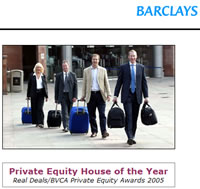 Now to us here at Digital Lifestyles, this threatened action seems to have a bit of a King Canute/70’s vibe about it. The truth of the matter, is that the competitive landscape has changed in telecommunications and broadcasting. BT is answerable to their city shareholders, and a move to tackle some of the entrenched attitudes within the company’s workforce might be looked on favourably by the number crunchers around the London stock exchange.
Now to us here at Digital Lifestyles, this threatened action seems to have a bit of a King Canute/70’s vibe about it. The truth of the matter, is that the competitive landscape has changed in telecommunications and broadcasting. BT is answerable to their city shareholders, and a move to tackle some of the entrenched attitudes within the company’s workforce might be looked on favourably by the number crunchers around the London stock exchange.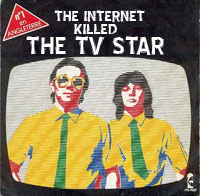 Big glasses-toting Buggles sang about ‘Video Killing The Radio Star’ back in 1979, but new figures from Ofcom suggest that the while Internet may not exactly be killing TV, it’s certainly giving it a bit of a duffing behind the bike sheds.
Big glasses-toting Buggles sang about ‘Video Killing The Radio Star’ back in 1979, but new figures from Ofcom suggest that the while Internet may not exactly be killing TV, it’s certainly giving it a bit of a duffing behind the bike sheds. Industry pundits are collaring the Internet as the reason for this decline, along with DVDs and gaming.
Industry pundits are collaring the Internet as the reason for this decline, along with DVDs and gaming.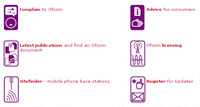 Consumer broadband continues its exponential growth, exploding from zero to 10 million connections in just over seven years, with some 70,000 new connections being added per week.
Consumer broadband continues its exponential growth, exploding from zero to 10 million connections in just over seven years, with some 70,000 new connections being added per week.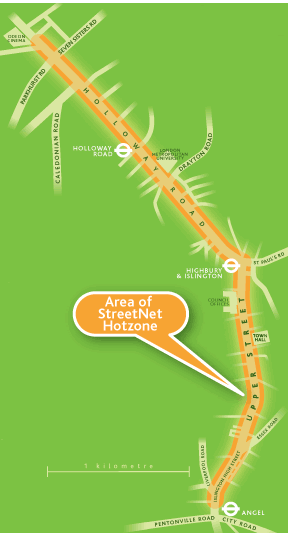 Islington’s free WiFi cloud to extended well beyond the initial Technology Mile.
Islington’s free WiFi cloud to extended well beyond the initial Technology Mile.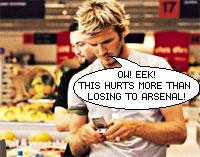 According to a new survey from Virgin Mobile, mobile telephone text messaging has become so popular in the UK that millions are complaining of injuries to their thumbs and fingers.
According to a new survey from Virgin Mobile, mobile telephone text messaging has become so popular in the UK that millions are complaining of injuries to their thumbs and fingers.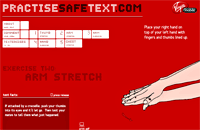 Despite the agony, it seems that Brits are prepared to go through the pain barrier to keep bashing out their texts, with more than twelve per cent admitting to sending 20 text messages a day – with a seriously obsessed ten per cent blasting out as many as 100 texts a day!
Despite the agony, it seems that Brits are prepared to go through the pain barrier to keep bashing out their texts, with more than twelve per cent admitting to sending 20 text messages a day – with a seriously obsessed ten per cent blasting out as many as 100 texts a day! Designed to highlight the very real problems of RSI, Virgin have sponsored a very useful site,
Designed to highlight the very real problems of RSI, Virgin have sponsored a very useful site, 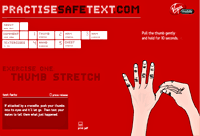 As a recent sufferer of RSI (brought on by long hours sweating over a hot Logitech as I try to bring you, dear reader, the latest stories), I strongly recommend you try out some of the exercises.
As a recent sufferer of RSI (brought on by long hours sweating over a hot Logitech as I try to bring you, dear reader, the latest stories), I strongly recommend you try out some of the exercises.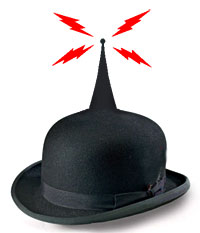 The City of London is to get blanket Wi-Fi, with city slickers able to access the Web anywhere within London’s famous financial district, the Square Mile.
The City of London is to get blanket Wi-Fi, with city slickers able to access the Web anywhere within London’s famous financial district, the Square Mile.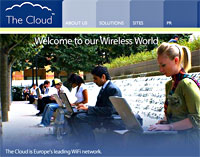 Unfortunately, unlike the free Wi-Fi service
Unfortunately, unlike the free Wi-Fi service  The move follows an announcement that The Cloud would be installing network hubs and rolling out WiFi in nine cities across Britain, including Edinburgh, Leeds, Manchester, Oxford and Liverpool.
The move follows an announcement that The Cloud would be installing network hubs and rolling out WiFi in nine cities across Britain, including Edinburgh, Leeds, Manchester, Oxford and Liverpool. We covered
We covered  For the second time in a fortnight, coastguards have been scrambled after a digital TV box sent out a signal on a wavelength used by ships in distress.
For the second time in a fortnight, coastguards have been scrambled after a digital TV box sent out a signal on a wavelength used by ships in distress.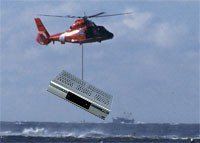 An Ofcom spokesman explained that the faulty boxes are now being examined for malfunctioning components, adding: “Apparently any device capable of receiving a signal can also send a signal if it malfunctions. To the best of our knowledge these are the only two out of millions of Freeview users in the UK to have experienced this problem.”
An Ofcom spokesman explained that the faulty boxes are now being examined for malfunctioning components, adding: “Apparently any device capable of receiving a signal can also send a signal if it malfunctions. To the best of our knowledge these are the only two out of millions of Freeview users in the UK to have experienced this problem.”